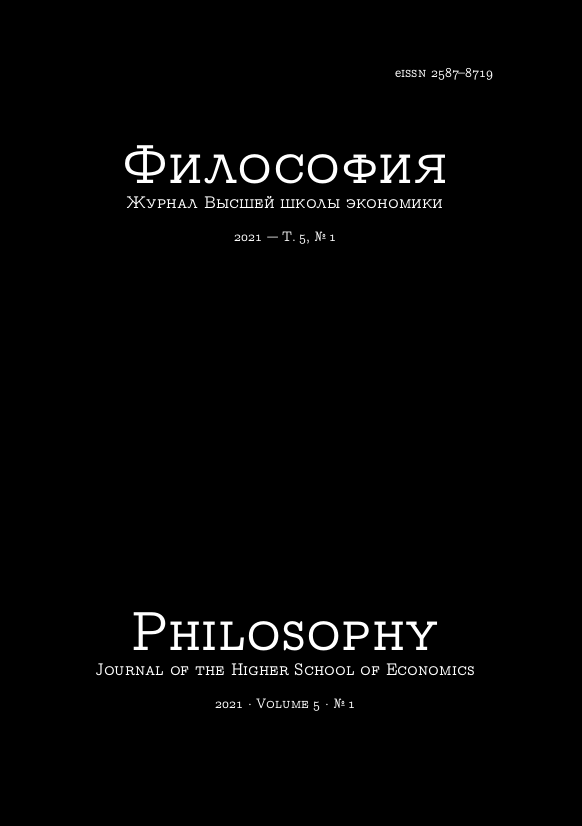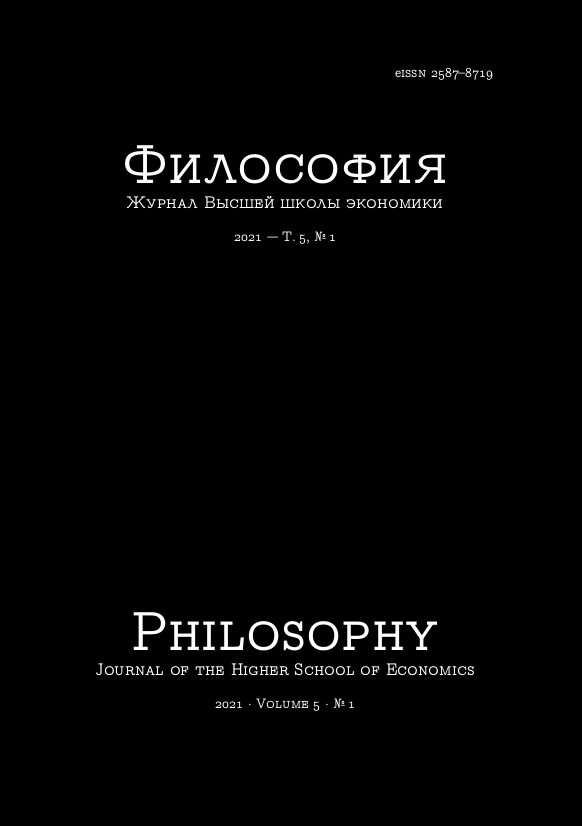
The current issue dedicated to Vladimir Bibikhin (1938-2004) is a result of the International Vladimir Bibikhin Conference (Bibikhin Readings), which has been held since 2019 in the birthplace of the thinker and translator in Bezhetsk (Tver region). Famous philosophers and philologists from Moscow, St. Petersburg, Kazan, Saratov and Kiev took part in this event. The authors of the issue focus on the central themes of Bibikhin's philosophy — energy, the event of the world, captureness, automaton, sophia, the other beginning.
In his philosophical constructions, Vladimir Bibikhin in particular relies on the heritage of Greek philosophy. That is why we decided to open the issue with two articles on ancient ethics. Irina Makarova, in her article "Piety: the Lost virtue of Aristotle?", delves into the ethical treatises of Aristotle in order to find traces of "lost" piety (hosiotēs) among the ethical and dianoetic virtues. Aleksey Pavlov's article "The 'Analytical' branch of modern stoicism: L. Becker, W. Irwin, M. Piliucci" highlights the work of three ideological leaders of this direction, explaining the relevance of stoic ethics for a 20th century man.
When the issue was being prepared, the sad news came about the sudden death of one of the initiators and inspirers of the Bezhetsk Readings, an outstanding mathematician and physicist, philosopher, theologian and translator Sergey Khoruzhiy (1941-2020). He remained Bibikhin's intellectual sparring partner for several decades. Therefore, the issue opens with two articles about the "polemical friendship" of the two philosophers.
In his article "Synergy Polemis" Anatoliy Akhutin masterfully introduces the ontological aporetics of European thought, from which one of the most vivid discussions of modern Russian philosophy, reminiscent of the Byzantine disputes of the XIV century, has grown. Yuriy Romanenko reveals the "The Eventful Character of Vladimir Bibikhin’s Philosophical Thought" in a historical review of its academic reception over the past decade. The author also focuses on ontological topics and, analyzing in detail the concepts of “paradox” and “change of aspect”, alternately shows the repulsions and convergence between the thought of Bibikhin and the thought of Wittgenstein, Heidegger, Losev, Pyatigorsky, Akhutin.
The second part of the research is a series of hermeneutical interpretations of Bibikhin's philosophy. Mikhail Bogatov in the article "Thematization of Lecture Courses: Vladimir Bibikhin’s Strategies of Thought" reminds us that all of Bibikhin's most famous books are his lecture courses given at Moscow State University, the St. Thomas Institute, the St. Philaret Institute, and Institute of Philosophy (Russian Academy of Science). The author suggests paying attention to the non-standard composition of even the most "traditional" courses (such as "Philosophy of Law" and "History of Modern Philosophy"). He identifies here specific "expedients" (ways of thinking) that serve to form the subject field of the lecture course, and comes to an important heuristic conclusion: "Any formalization of Bibikhin's thought that does not capture the specifics of the hermeneutic situation will always turn out to be conditional and ineffective."
Other articles in this section demonstrate to a certain extent the fidelity to this principle of reading. Aleksey Babanov in the article “The Correlation Between Ontology and Ethics in Vladimir Bibikhin’s Philosophy: Automatic Morality” works with the courses "The Pravda" ("Ontological Foundations of Ethics") and "The Woods". He finds the answer in the paradoxical concept of "automatic morality", which is used to solve the problem of conscious or unconscious choice. Kate Khan in her research addresses the phenomenology of the mood of historical time in V. Bibikhin and P. Ricoer, justifying this convergence with a common intellectual context (Aristotle, Augustine, Heidegger). Yelena Smirennikova examines a fragment of the first lecture course "The World" (1988/89), where eternity is interpreted as a "young-new", a constant renewal that manifests itself in the event, in the present.
“An interview with Sergey Khoruzhiy on the History and Current State of Russian Religious Thought” is first published in Russian. The conversation initiated by Kristina Stoeckl and Alexander Mikhailovsky in the spring of 2015 and held at the Institute of Human Sciences (Vienna) in English reveals many interesting facts and casts a new light on the intellectual history of the late Soviet and post-Soviet period.
In the section "Publications and Translations" there are two interesting texts. The first is a previously unpublished lecture by Vladimir Bibikhin from the course on Wittgenstein's philosophy of the 2002/2003 academic year, transcribed and presented by Vasilina Yarovova. The second is the little-known work of Max Scheler “On Eastern and Western Christianity” (Über östliches und westliches Christentum), first published in 1916 and most recently translated into Russian by A. N. Malinkin. The article by Alexander Mikhailovsky introduces Scheler into the context of the "military philosophy" and emphasizes the importance of F. M. Dostoevsky for the perception of Russia by German intellectuals in the first quarter of the 20th century.
The review section contains three articles. Vladimir Bliznekov's review critically examines the publication of the first translation of Bibikhin's essays into German under the title Der andere Anfang (2020). And two other texts are devoted to the discussion of the publications of the staff of the School of Philosophy and Cultural Studies: Alexander Markov chose for his analysis the work of G. I. Chernavin on phenomenological demonology The Philosophy of the Troll (2021), and Svetlana Neretina draws the attention of readers to the first book of the young researcher A. K. Kulikov Mythological Motifs in the Works of N. V. Gogol.
The issue concludes with a detailed review of the Second Bibikhin Readings in Bezhetsk (December 2020), prepared by the active participants of the conference – Kate Khan and Anastasiya Tomashevskaya.
Alexander Mikhaylovskiy






